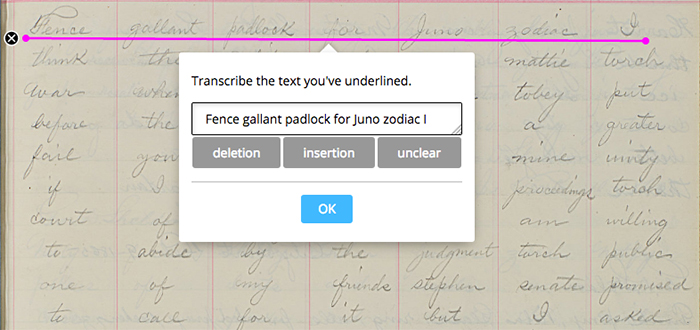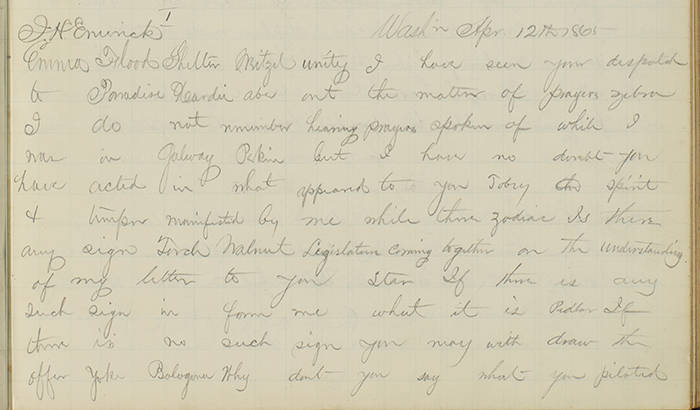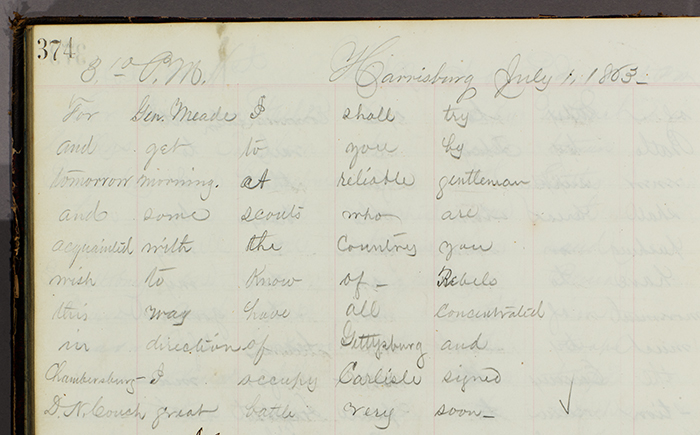
On the "Decoding the Civil War" website, a citizen archivist transcribes the first line of an encoded telegram.
In June 2016, The Huntington launched a crowdsourcing project called “Decoding the Civil War” to transcribe and decipher a collection of 15,922 U.S. Civil War telegrams between Abraham Lincoln, his Cabinet, and officers of the Union Army. This extraordinarily rare collection, acquired by The Huntington in 2012, is a near-complete archive of the papers of Thomas T. Eckert (1825–1910), the head of the military telegraph office of the War Department under Lincoln.
Funded in part by a two-year federal grant from the National Historical Publications and Records Commission, the project involves a partnership between The Huntington, the Abraham Lincoln Presidential Library and Museum, North Carolina State University’s Digital History and Pedagogy Project, and Zooniverse, the largest online platform for collaborative volunteer research.
Thus far, the project has enlisted more than 3,900 volunteers—known as “citizen archivists”—who have transcribed roughly half of the handwritten telegrams. But there is still much more work to be done. As a result, The Huntington and its partners have issued a challenge: double the rate of transcriptions per day over the next two weeks.

Encoded telegram from President Lincoln to General Weitzel, April 12, 1865, from a ledger of the United States Military Telegraph, War Department, Jan. 21, 1864–Dec. 7, 1865. The Huntington Library, Art Collections, and Botanical Gardens.
“Our volunteers have been doing yeoman’s service to collectively turn out roughly 200 pages of transcriptions per day,” says Mario Einaudi, Kemble Digital Projects Librarian at The Huntington. “However, we have fallen behind where we had hoped to be at this stage of our project. So, we are asking both new and current volunteers to help us transcribe 10 telegram ledgers—a total of nearly 600 pages of telegrams—between April 17 and May 1. This will help us achieve our goal of having the greater part of the ledgers transcribed by June 2017.”
People interested in participating in the transcription challenge can go to the project’s Zooniverse website, “Decoding the Civil War,” take a brief tutorial that explains the process for transcribing a telegram, and find further information on the project. If participants are interested in joining discussions on particular telegrams, then they will need to create a user name and password by registering with Zooniverse.
“The canard is often repeated that libraries and archives are dead. Or, if not dead, then they are simply morgues for outdated material,” says Einaudi. “Our partners and volunteers have demonstrated that active collaboration, research, and discovery are still vital. Working together, we can meet this challenge!”

Decoded telegram from General Darius N. Couch to General George G. Meade, 3:10 p.m., Harrisburg, Pa., July 1, 1863. The last four words, great battle very soon, were added by the telegraph operator and presage the Battle of Gettysburg. The Huntington Library, Art Collections, and Botanical Gardens.
You can start transcribing telegrams now at the “Decoding the Civil War” website.
Related content on Verso:
Decoding the Civil War (June 21, 2016)
Kevin Durkin is managing editor in the office of communications and marketing at The Huntington.
